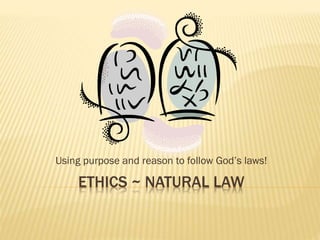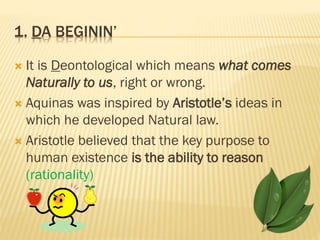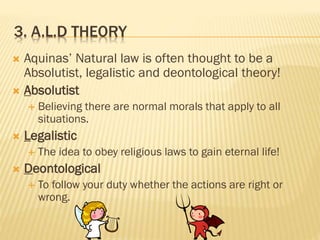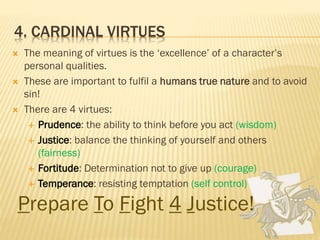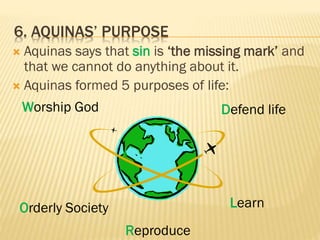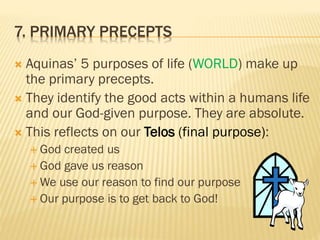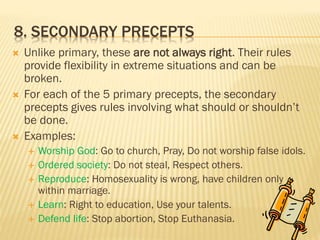Ethics ~ natural law
- 1. ETHICS ~ NATURAL LAW Using purpose and reason to follow Godâs laws!
- 2. 1. DA BEGININâ ï It is Deontological which means what comes Naturally to us, right or wrong. ï Aquinas was inspired by Aristotleâs ideas in which he developed Natural law. ï Aristotle believed that the key purpose to human existence is the ability to reason (rationality)
- 3. 2. NATURAL LAW THINKING ï Aristotle: ï As an example of this, a good knife is one that cuts well. ï It must be an agent to bringing something about (Efficient cause) and to fulfil its final purpose of something (Final cause) Something is good as long as it fulfils itâs purpose. Efficient cause: What gets it done Final cause: The final result
- 4. 3. A.L.D THEORY ï Aquinasâ Natural law is often thought to be a Absolutist, legalistic and deontological theory! ï Absolutist ï Believing there are normal morals that apply to all situations. ï Legalistic ï The idea to obey religious laws to gain eternal life! ï Deontological ï To follow your duty whether the actions are right or wrong.
- 5. 4. CARDINAL VIRTUES ï The meaning of virtues is the âexcellenceâ of a characterâs personal qualities. ï These are important to fulfil a humans true nature and to avoid sin! ï There are 4 virtues: ï Prudence: the ability to think before you act (wisdom) ï Justice: balance the thinking of yourself and others (fairness) ï Fortitude: Determination not to give up (courage) ï Temperance: resisting temptation (self control) Prepare To Fight 4 Justice!
- 6. 5. REVEALED VIRTUES ï The three revealed virtues involve faith, hope and charity. They can only be received if infused by divine grace. ï Faith: To follow and believe in God ï Hope: That there is life after death with God. ï Charity: To be selfless and to think of others.
- 7. 6. AQUINASâ PURPOSE ï Aquinas says that sin is âthe missing markâ and that we cannot do anything about it. ï Aquinas formed 5 purposes of life: Worship God Orderly Society Reproduce Learn Defend life
- 8. 7. PRIMARY PRECEPTS ï Aquinasâ 5 purposes of life (WORLD) make up the primary precepts. ï They identify the good acts within a humans life and our God-given purpose. They are absolute. ï This reflects on our Telos (final purpose): ï God created us ï God gave us reason ï We use our reason to find our purpose ï Our purpose is to get back to God!
- 9. 8. SECONDARY PRECEPTS ï Unlike primary, these are not always right. Their rules provide flexibility in extreme situations and can be broken. ï For each of the 5 primary precepts, the secondary precepts gives rules involving what should or shouldnât be done. ï Examples: ï Worship God: Go to church, Pray, Do not worship false idols. ï Ordered society: Do not steal, Respect others. ï Reproduce: Homosexuality is wrong, have children only within marriage. ï Learn: Right to education, Use your talents. ï Defend life: Stop abortion, Stop Euthanasia.
- 10. 9. INTERIOR AND EXTERIOR ACTS ï An interior act involves a good action with a good motive. E.g. Giving to the poor to help them. ï An exterior act is an action that seems right but with a wrong motive. E.g. Giving to the poor to show off your wealth. ï But double effect which involves an interior act does not mean that the good act would lead to a happy consequence. Such as a doctor trying to save a pregnant woman's life. The result may lead to the child dying, but his intention was not this, therefore his motive was good.
